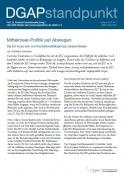In the course of the upheavals in the Arab world, the EU was broadly criticized for having up until then cooperated largely unconditionally with the region’s autocratic regimes. As a result of this criticism, it decided to place greater emphasis on the principle of conditionality, instituting a policy by which Brussels would provide its neighbors with more support in exchange for higher willingness to undertake reforms. If neighbors failed to tackle the agreed-upon reforms, on the other hand, the EU would correspondingly reduce its aid. This line was clearly emphasized in the revised version of the European Neighborhood Policy of May 25, 2011.
The approach is of course far from new. Both the Union’s Enlargement Policy and its Neighborhood Policy build on it. The underlying logic is as follows: the EU is the model, and its neighboring countries strive to approach this model in order to take advantage of proposed incentives. In terms of EU Enlargement Policy and (to a slightly lesser extent) the EU’s Eastern Neighborhood Policy, this approach has functioned fairly well. It cannot simply be applied without any further ado to the Union’s neighbors to the south, however – and not just because of poor policy implementation or lack of coordination among member states.
Inadequate incentives for partners
The EU’s neighbors to east have had, and continue to have, a clear, attractive incentive for instituting reforms: the prospect of EU membership. This option even extends to the countries of the Southern Caucasus, even if they do not (yet) have official EU candidate status. Combined with financial aid, this option is an attractive enough incentive for most neighbors to take on the costs of reforms and legal alignment. For this reason, the policy of conditionality can work quite well for potential candidate countries.
For the states on the southern and eastern edges of the Mediterranean, however, EU membership is hardly a plausible scenario. The only real incentives for them are financial aid, integration with the EU’s internal market, and visa liberalization. In short: money, market access, and mobility. But such offers are not attractive enough for broad political preconditions to be attached to them.
In order for countries to maintain access to the EU internal market, Brussels is offering its neighbors the opportunity to negotiate so-called “deep and comprehensive” free trade agreements. The deal goes like this: the EU furnishes its neighbors with a partial opening of its market in return for bringing their legal provisions into line with European law. This would be an interesting offer if the EU were at least to give a more prominent place to important areas such as the agricultural sector. Conversely, however, neighboring countries would naturally have to open up their markets to European products, thereby exposing their national economies to strong European competition. The financial as well as political costs of legal alignment are, furthermore, extremely high. For example, the EU’s neighbor states would have to invest in restructuring their administrations and undertake unpopular reforms such as eliminating food subsidies. While countries striving for EU membership have been able to justify such measures to their citizens on the grounds that they are necessary preconditions for joining the Union, this is not a viable option for the EU’s southern neighbors.
The EU also holds out to its neighbors the prospects of so-called “mobility partnerships,” agreements intended to offer migrants more attractive incentives to return to their home countries, to grant temporary work and study visas, and to cooperate on countering illegal migration. But even if the EU were to forego costly conditions such as readmission agreements, the benefit of such partnerships for neighboring countries would be negligible. Loosening visa policies for members of certain professions that are in demand in the EU would hardly help allay the strained employment situations in neighboring countries. It is far more likely, in fact, that partner states need those very same professional groups that are of interest to the EU.
The most attractive incentive Brussels has to offer comes in the form of financial aid. At least a few of the neighboring countries to the south will find themselves depending on external aid payments in the years ahead because of their poor economic situations and substantial budget deficits. Since the start of the upheavals in the Arab world, the EU has indeed increased its resources, but only slightly. EU contributions pale in comparison to the substantial sums flowing into the region from the US, for example, and from the Gulf states in particular. In a few days in July 2013, for example, Saudi Arabia, Kuwait, and the United Arab Emirates together made available loans and aid payments to Egypt that amounted to over 9 billion euros.
The benefits being offered in each of the areas of money, market access, and mobility are simply not enough for a policy approach that ties support to conditions. Indeed, in certain areas such as migration, energy supply, and the fight against terrorism, the EU is a good deal more dependent on cooperation with its neighbors than the other way around. In this way, relations of dependence between the EU and its partners are at least partially turned on their heads.
Private investment and tourism are arenas of decisive importance for at least a few of Europe’s southern neighbors. They provide only an extremely limited incentive in the sense of political conditionality, however, for conditionalization policy is an instrument for cooperation among governments not private actors. Despite occasional statements to the contrary, tourists and business entrepreneurs are chiefly interested in stability and security. A country’s form of government and whether or not it adheres to human rights, are of secondary importance to them.
The EU is only one actor among many
In addition to the absence of adequate incentives, a second precondition is also missing for conditionality to function properly. The EU is perceived in its southern neighborhood as a model of only limited attractiveness. When the people of Tunis and Cairo took to the streets, they were not calling for democracy modeled strictly on the European example. Unlike the “color revolutions” of Eastern Europe, no EU flags were being waved here. And while many of the demonstrators’ demands—from the rule of law to the abolition of torture to the introduction of a multi-party system—are indeed central aspects of Western democracy, all of the active political camps have nonetheless emphasized that the Arab states must develop their own form of democracy, one that corresponds to local, cultural, and religious specificities.
Add to this the fact that the EU is just one of several actors in the region and that it is primarily regarded as an economic actor—one with whom one gladly engages in trade but whose political influence is held to be rather limited. On its eastern periphery, the EU was regarded as a model not least because a turn toward Europe seemed to be the only alternative to dependence on Russia. On the southern and eastern edges of the Mediterranean, however, a number of countries are vying for economic as well as political influence, including the Gulf states, the US, Turkey, Iran, and Russia. This competition has, if anything, grown since the upheavals of 2011, as many governments in the region are on the lookout for new partners outside of their already established relationships.
When negotiations faltered on a loan for Egypt from the International Monetary Fund, for example, the Gulf states jumped in on short notice with payments amounting to billions. When relations between Washington and Cairo took a turn for the worse and the US dialed back its military aid to Egypt, Russia was quick to offer military cooperation. For their part, Morocco and Jordan were offered membership in the Gulf Cooperation Council.
What is the alternative?
As noble as the aspirations driving the conditionality-based approach may be, and as desirable the outcome, the EU must nonetheless acknowledge that the policy is simply not working in its southern neighborhood. Brussels’s offers are insufficient, the EU model is only of limited appeal, no genuine dependence will be achieved, and the EU must compete with a number of other actors. Brussels has to recognize that the non-democratic regimes in the region cannot be pushed to reform via the mechanism of conditionality and that Europe’s political influence is very limited indeed. At the same time, the EU needs to be aware of what will happen if Brussels continues to attach strings to its cooperation with North African and Middle Eastern countries. If it does, other countries will step in to replace the Europeans. But is it preferable that the Gulf states provide financial aid in the educational sector? Would it in fact be better if China and Russia stepped in to work with North African states on matters of security?
The EU’s policy of conditionality is intended to assert the norms and values of the EU in its neighboring countries. Turning away from this approach should not nonetheless mean that any normative element should be abolished from European foreign policy. Of course the EU cannot treat autocrats in the same way it treats democratic governments. It goes without saying that weapons and technical capabilities should not be delivered to regimes so that they can suppress the opposition. No programmatic conditionality is needed for the EU to express criticism of undesirable developments, bring government talks to a halt, or summon ambassadors. Brussels must be careful that its financial aid does not end up helping the budgets of authoritarian dictators but rather that it benefits populations. This should be the normative component of a responsibly, honest, and at the same time realistic foreign policy that stands for its values, even without conditionality.
Money, market access, and mobility can remain priority areas of cooperation beyond the conditionality-based approach. If Brussels is genuinely interested in supporting its neighbors, then it must put each incentive to the test to find out which ones are actually serving them well. At any rate, the themes and instruments that have been used up until now are tailored too closely to the needs of the EU’s European neighbors to fit those of its southern neighbors. After all, one size does not fit all.

